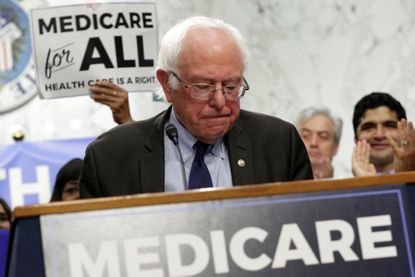The magical thinking of Medicare for all
What math-defying tax cuts are to the GOP, single-payer now is to Democrats


Democrats rightly attack Republicans when the party's politicians and pundits perennially propose some fantastical, math-defying tax-cut plan that will slash government revenue but supposedly still not balloon deficits. During the presidential campaign, for instance, Democrats hammered Donald Trump for offering two wildly unrealistic proposals. One would have slashed federal tax revenue by a trillion bucks a year, the other a half trillion. This from the nominee of a party that not long ago was warning how skyrocketing government debt levels might ignite another financial crisis.
Were there some good ideas within those Trump blueprints? Absolutely. Lowering the corporate tax rate, allowing companies to immediately expense new capital investment, and broadening the tax base all individually have merit. But overall the plans were fatally defective because they avoided making hard choices or acknowledging necessary tradeoffs. In short, they were dreamy campaign documents that merited much mockery. Voters deserved better.
What tax cuts are to Republicans, single-payer health care seems to now be for Democrats: a popular, populist policy idea that's far more attractive in broad strokes than devilish details. Just take a look at Bernie Sanders' long-awaited Medicare-for-all legislation, introduced yesterday in the Senate. It's more like the Don't Worry, Everything's Pretty Much Covered Act of 2017. Just flash your Universal Medicare card, and you're entitled to generous — even compared to single-payer plans in other advanced economies — comprehensive health-care services: hospital care, doctor visits, mental health care, eyecare, and more.
Subscribe to The Week
Escape your echo chamber. Get the facts behind the news, plus analysis from multiple perspectives.

Sign up for The Week's Free Newsletters
From our morning news briefing to a weekly Good News Newsletter, get the best of The Week delivered directly to your inbox.
From our morning news briefing to a weekly Good News Newsletter, get the best of The Week delivered directly to your inbox.
Would taxes go up? Well, yeah, of course. But why should Sanders kill the buzz by getting into all that unpleasantness? Recall that economists sharply criticized his presidential campaign's health-care plan for severely underestimating the costs of the comprehensive benefits it offered and thus underestimating the much higher taxes — maybe twice as high as Sanders estimated — needed to pay for it.
But that's hardly where the problems end for BernieCare. His plan would also phase out employer-provided health care. That, even though some 70 percent of workers in those plans say they're satisfied with their coverage. Sanders' plan would require millions of Americans to trade something that seems to be more or less working for them for something new and uncertain, both in coverage and cost.
In other words, the Sanders plan fails to recognize either political or economic reality, much in the same way Republican tax cutters frequently do. When a GOPer argues for "scrapping the tax code" despite all the long-term business investment and personal retirement plans built around it, that's ignoring real-world constraints. But ignoring constraints is what populists do the world over. They capitalize on economic dissatisfaction by promising economic salvation, as noted in the classic 1991 paper "The Macroeconomics of Populism" by Rudiger Dornbusch and Sebastian Edwards. From that research into Latin American economic failure:
Again and again, and in country after country, policymakers have embraced economic programs that rely heavily on the use of expansive fiscal and credit policies and overvalued currency to accelerate growth and redistribute income. In implementing these policies, there has usually been no concern for the existence of fiscal and foreign exchange constraints. … The final outcome of these experiments has generally been galloping inflation, crisis, and the collapse of the economic system. … The self-destructive feature of populism is particularly apparent from the stark decline in per capita income and real wages in the final days of these experiences. [The Macroeconomics of Populism]
The U.S. isn't near collapse. It's a wealthy and productive nation with the world's reserve currency. Things are actually going pretty well right now. Unemployment and inflation are low, while incomes are rising. Now is hardly time to gamble on risky, ill-considered populist schemes from the left or right, or even be distracted by them.
How about this instead: Stabilize ObamaCare. Reform the tax code to encourage more domestic investment. And do both in a bipartisan, fiscally responsible way. Then focus on preparing the American workforce for a technologically evolving economy. Call it Better Skills for All.
Sign up for Today's Best Articles in your inbox
A free daily email with the biggest news stories of the day – and the best features from TheWeek.com
James Pethokoukis is the DeWitt Wallace Fellow at the American Enterprise Institute where he runs the AEIdeas blog. He has also written for The New York Times, National Review, Commentary, The Weekly Standard, and other places.
-
 Octopuses could be the next big species after humans
Octopuses could be the next big species after humansUNDER THE RADAR What has eight arms, a beaked mouth, and is poised to take over the planet when we're all gone?
By Rafi Schwartz, The Week US Published
-
 Sudoku medium: December 23, 2024
Sudoku medium: December 23, 2024The Week's daily medium sudoku puzzle
By The Week Staff Published
-
 Crossword: December 23, 2024
Crossword: December 23, 2024The Week's daily crossword
By The Week Staff Published
-
 US election: who the billionaires are backing
US election: who the billionaires are backingThe Explainer More have endorsed Kamala Harris than Donald Trump, but among the 'ultra-rich' the split is more even
By Harriet Marsden, The Week UK Published
-
 US election: where things stand with one week to go
US election: where things stand with one week to goThe Explainer Harris' lead in the polls has been narrowing in Trump's favour, but her campaign remains 'cautiously optimistic'
By Harriet Marsden, The Week UK Published
-
 Is Trump okay?
Is Trump okay?Today's Big Question Former president's mental fitness and alleged cognitive decline firmly back in the spotlight after 'bizarre' town hall event
By Harriet Marsden, The Week UK Published
-
 The life and times of Kamala Harris
The life and times of Kamala HarrisThe Explainer The vice-president is narrowly leading the race to become the next US president. How did she get to where she is now?
By The Week UK Published
-
 Will 'weirdly civil' VP debate move dial in US election?
Will 'weirdly civil' VP debate move dial in US election?Today's Big Question 'Diametrically opposed' candidates showed 'a lot of commonality' on some issues, but offered competing visions for America's future and democracy
By Harriet Marsden, The Week UK Published
-
 1 of 6 'Trump Train' drivers liable in Biden bus blockade
1 of 6 'Trump Train' drivers liable in Biden bus blockadeSpeed Read Only one of the accused was found liable in the case concerning the deliberate slowing of a 2020 Biden campaign bus
By Peter Weber, The Week US Published
-
 How could J.D. Vance impact the special relationship?
How could J.D. Vance impact the special relationship?Today's Big Question Trump's hawkish pick for VP said UK is the first 'truly Islamist country' with a nuclear weapon
By Harriet Marsden, The Week UK Published
-
 Biden, Trump urge calm after assassination attempt
Biden, Trump urge calm after assassination attemptSpeed Reads A 20-year-old gunman grazed Trump's ear and fatally shot a rally attendee on Saturday
By Peter Weber, The Week US Published